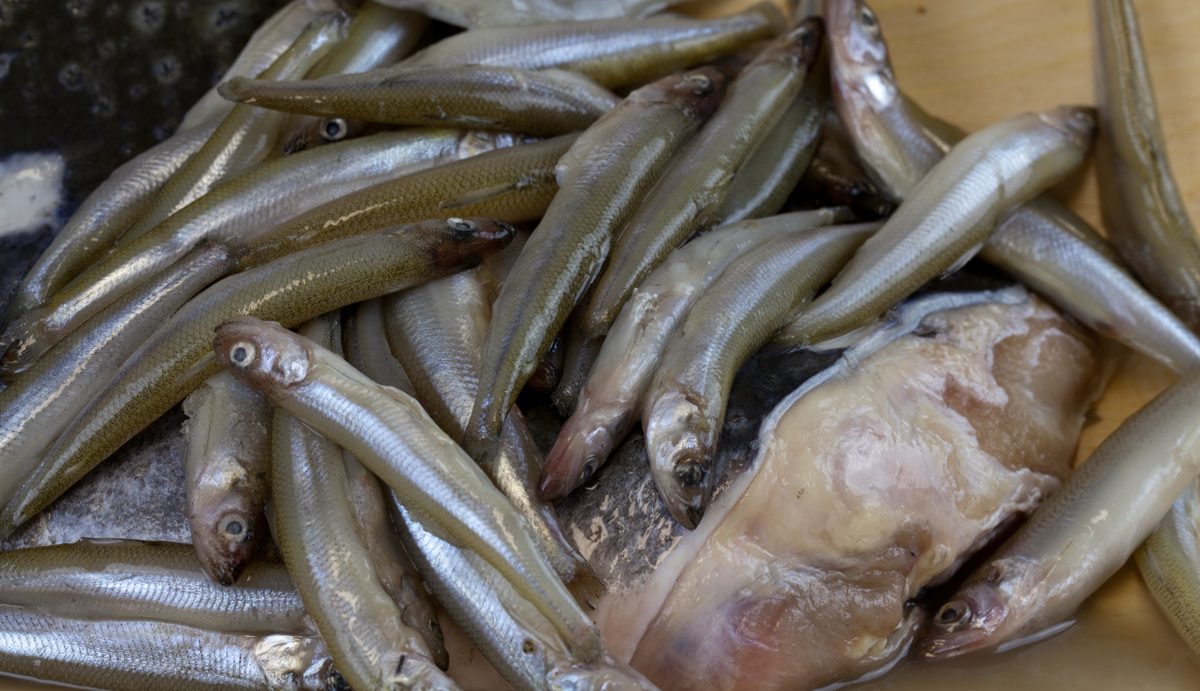Clatsop traders come to the fort to sell food and a slave boy. Every offer is declined except for some sturgeon. The hunters find elk nearly ten miles out, and Lewis discusses the white-tailed jackrabbit.
Recap of the Month
by Yellowstone Public Radio[1]Originally aired weekdays by Yellowstone Public Radio during the Bicentennial observance of 2003-2006. Narrated by Hal Hansen. Scripts by Whit Hansen and Ed Jacobson. Produced by Leni Holliman. © … Continue reading
Anchovies [Eulachon] and Sturgeon
© 2011 by Kristopher K. Townsend. Permission to use granted under the Creative Commons Attribution-Share Alike 4.0 International license.
Clatsop Traders
Kus ke-lar a Clatsop man, his wife and a Small boy (a Slave, who he informed me was his Cook, and offerd to Sell him to me for beeds & a gun) visited us to day they brought Some anchovies, Sturgeon, a beaver robe, and Some roots for Sale tho’ they asked Such high prices for every article that we purchased nothing but a part of a Sturgeon for which we gave a fiew fishing hooks.
—William Clark
Elk Hunting
Shields[,] Jos. Fields and Shannon returned late this evening having killed five Elk tho’ two of them ar on a mountain at a considerable distance. we ordered these hunters to return early in the morning and continue their hunt, and Sergt. Gass to take a party and go in quest of the Elk which they had killed. the hunters inform us that the Elk are tolerable plenty near the mountains about 9 or ten miles distant.
—Meriwether Lewis
White-tailed Jackrabbit
The hare on this side of the Rocky mountains is exclusively the inhabitant of the great Plains of Columbia, as they are of those of the Missouri East of these mountains . . . . I have measured the leaps of this animal and find them commonly from 18 to 21 feet.
—Meriwether Lewis
Weather Diary
aspect of the weather at rise
Wind at rise
aspect of the weather at 4 OC1 P.M. Wind at 4 O’Clock P.M. rain after rain S. W cloudy after clouds & fair S. W it rained constantly during the last night. the sun shown about 9 A. M. partially a few minutes saw a variety of insects in motion this morning some small bugs as well as flies. a brown fly with long legs about half the size of the common house fly was the most common. this has been the first insect that appeared it is generally about the sinks or filth of any kind. the yellow and brown flycatch has returned. it is a very small bird with a tail as long proportiably as a Sparrow.
—Meriwether Lewis[2]To assist the reader, the editor of this web page has omitted the “Day of ye Month” column and spelled out some abbreviations.
Experience the Lewis and Clark Trail
The Lewis and Clark Trail Experience—our sister site at lewisandclark.travel—connects the world to people and places on the Lewis and Clark Trail.
Plan a trip related to February 28, 1806:

Fort Clatsop is a High Potential Historic Site along the Lewis and Clark National Historic Trail managed by the U.S. National Park Service. The site is managed by the Lewis and Clark National and State Historic Parks.
Notes
| ↑1 | Originally aired weekdays by Yellowstone Public Radio during the Bicentennial observance of 2003-2006. Narrated by Hal Hansen. Scripts by Whit Hansen and Ed Jacobson. Produced by Leni Holliman. © 2003 by Yellowstone Public Radio. |
|---|---|
| ↑2 | To assist the reader, the editor of this web page has omitted the “Day of ye Month” column and spelled out some abbreviations. |



